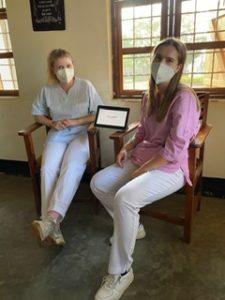Today marked the first full day working at the hospital. The morning started with a case discussion about HELLP syndrome given by one of the other visiting learners (see below). Following this, we attended morning prayers with the nursing students and several of the staff from the hospital. The overwhelming religion in this region of Uganda is Christianity, but I did see several mosques as we drove in from Entebbe yesterday. The hospital was founded by a group of people from the Anglican church in Northern Ireland so most people are of this denomination, but as I understand there’s also a large population of people who practice Catholicism.
After prayers, the doctors then had a meeting where the on-call doctor overnight presented the patients to the day doctors. Then clinical time began, and I went with one of the local physicians to round on the female ward. The very first patient we saw had presented overnight with trouble breathing and epigastric (upper abdominal) pain. Long story short, this patient was diagnosed with 3rd degree heart block probably from a myocardial infarction (aka heart attack). This is a dangerous heart rhythm which is usually treated in the US with immediate pacemaker placement (not to mention that concern for a heart attack usually means immediate cardiac catheterization). These type of procedures are only performed in the capital which is about 3 to 4 hours away and would incur a considerable expense (creating numerous social issues for this family). Afterward, this patient would have no way to follow up with a cardiologist. For these reasons, it was deemed more appropriate to discharge the patient home than to proceed with this further treatment. This is a really difficult concept for me to understand: the risk of instituting treatment is higher than the risk of not doing so for the patient. I think surgeons, no matter where they train, learn this principle more so than medicine-based specialties. I will have to keep this lesson top of mind and remember the medical ethics principle of nonmaleficence.
Lugandan word of the day: Weebale (“We-ball-ay”, thank you)
Medical learning point of the day: Part of taking a good medical history in Uganda includes asking what tribe the patient is from. This information helps stratify risk for certain conditions based off local practices in those tribes. For example, one tribe in Uganda performs adult circumcision as a rite of passage for men. Sometimes these men develop uncontrolled bleeding or infections requiring medical attention and knowing their background helps healthcare practitioners better assess and treat the patient.


